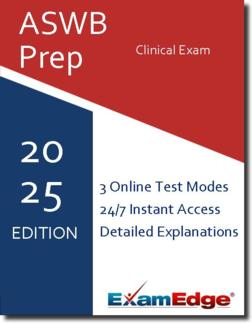ASWB Clinical Exam (CE) Practice Tests & Test Prep by Exam Edge - Topics
Based on 22 Reviews
- Real Exam Simulation: Timed questions and matching content build comfort for your ASWB Clinical Exam test day.
- Instant, 24/7 Access: Web-based ASWB Clinical Exam practice exams with no software needed.
- Clear Explanations: Step-by-step answers and explanations for your ASWB exam to strengthen understanding.
- Boosted Confidence: Reduces anxiety and improves test-taking skills to ace your ASWB Clinical Exam (CE).

Understanding the exact breakdown of the ASWB Clinical Exam test will help you know what to expect and how to most effectively prepare. The ASWB Clinical Exam has multiple-choice questions The exam will be broken down into the sections below:
| ASWB Clinical Exam Exam Blueprint | ||
|---|---|---|
| Domain Name | % | Number of Questions |
| Human Development, Diversity , and Behavior in the Environment | 31% | 31 |
| Assessment, Diagnosis, and Treatment Planning | 26% | 26 |
| Psychotherapy, Clinical Interventions, and Case Management | 25% | 25 |
| Professional Ethics and Values | 18% | 18 |


